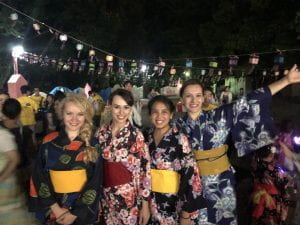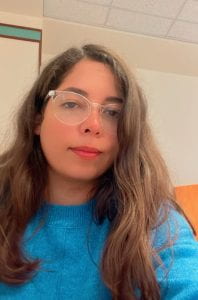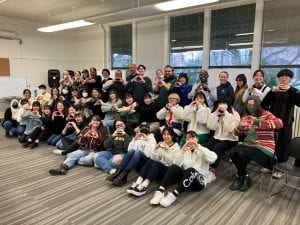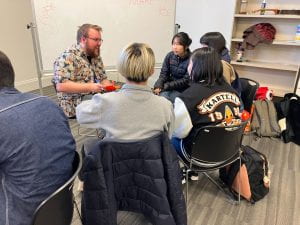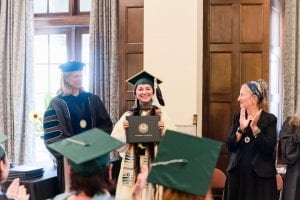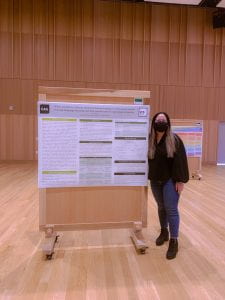– Post written by Emma Snyder, current LTS student
Winter term is coming to an end and warmer weather is right around the corner! We are sending thoughts and encouragements out to our students as they prepare for finals week. Make sure to rest well and take time to take care of yourself; we know you are all working hard. Today, I have been given the opportunity to spotlight a fantastic holiday, and speak a little bit on how it has impacted me personally, as well as how it can help LTS students in their paths as future educators.
On February 22nd, we celebrated Global Language Advocacy Day, an event organized each year by the Global Coalition for Language Rights (GCLR). The GCLR has been dedicated to their mission of language rights for all people for many years, and are strong advocates for digitally-empowered linguistic rights through the intersection of digital, human, and linguistic rights. UO LTS shares GCLR’s passion for language empowerment, and has had a strong multilingual approach, working to best support multilingual and multicultural language learners towards their language learning goals. UO continues to work to support teachers of minoritized languages, such as indigenous languages in the US. The Yamada Language Center’s Self Study Program is allowing students to learn less commonly taught languages in small, tight-knit classrooms led by native speakers. And the Center for Applied Second Language Studies continues to develop resources and curricula that utilize digital resources in new and innovative ways.
Every year, Global Language Advocacy Day brings together advocates for language rights to spark conversations and raise awareness for language rights. Webinars are hosted, lectures are led, and programs are proposed. This year’s theme was “Language Rights Save Lives.” There were several key events hosted as part of it, including a screening of Breathing Through the Feet – a film created as a response to post-apartheid Johannesburg language ecology– and the 7000 Languages Workshop, which worked with the Indigenous Mapping Collective to show community members how they could create online language learning materials for endangered languages. GCLR also opened a GLAD#23 blog on their website, where people could post their own experiences, observations, and research around language rights, and how language could impact the lives of its speakers.
 This concept, that language could be a matter of life and death, has been shown for centuries through the unequal treatment of speakers of non-dominant languages, and through the lack of resources for said speakers that has led to a noticeable disparity in public health. Recently, many groups that may have been unaware, or felt unaffected by such disparity were given an incredibly clear example with the onset of the COVID-19 pandemic. COVID-19 was largely advertised as being an absolutely grueling, but entirely survivable virus for the vast majority of Americans, save a small minority of various high-risk populations. This put many at ease. I was not fortunate to be among the many. As a severely immunocompromised person, COVID-19 was extremely dangerous, potentially life-threatening, and I spent the better part of two years absolutely terrified at the possibility of contracting it. The care, or lack thereof, in the way my friends and family interacted with COVID-19 permanently altered the relationships I had with them.
This concept, that language could be a matter of life and death, has been shown for centuries through the unequal treatment of speakers of non-dominant languages, and through the lack of resources for said speakers that has led to a noticeable disparity in public health. Recently, many groups that may have been unaware, or felt unaffected by such disparity were given an incredibly clear example with the onset of the COVID-19 pandemic. COVID-19 was largely advertised as being an absolutely grueling, but entirely survivable virus for the vast majority of Americans, save a small minority of various high-risk populations. This put many at ease. I was not fortunate to be among the many. As a severely immunocompromised person, COVID-19 was extremely dangerous, potentially life-threatening, and I spent the better part of two years absolutely terrified at the possibility of contracting it. The care, or lack thereof, in the way my friends and family interacted with COVID-19 permanently altered the relationships I had with them.
Language rights are just as important in the classroom setting. COVID-19 was the first time that I found myself within a minoritized population, with resources that were not designed to account for or accommodate me, and public opinion and misinformation that was at times actively harmful. For many, this has been the case for much longer, both inside and outside the classroom. Many languages have been deemed inherently unequal by the cultures and the contexts they exist within, and students are fighting to maintain not only their identities as speakers of multiple languages, but their identities as people of multiple cultures. It is our job as language educators to support them, and be sensitive to the trials that they face inside and outside the classroom. Several myths regarding imagined harm caused by bilingual learning have been empirically proven false. However, to many outside linguistic and language teaching communities, these ideas are still alive and well, and heritage languages are often lost by the third generation. These trends toward language loss can be fought, and UO, GCLR, and others like them have done wonders to bring accessibility and resources to better support those fighting it. And as we look toward you, our future language educators, we cannot wait to watch you take up arms and do the same.
To learn more about the Global Coalition for Language Rights, visit their website at coalitionforlanguagerights.org



